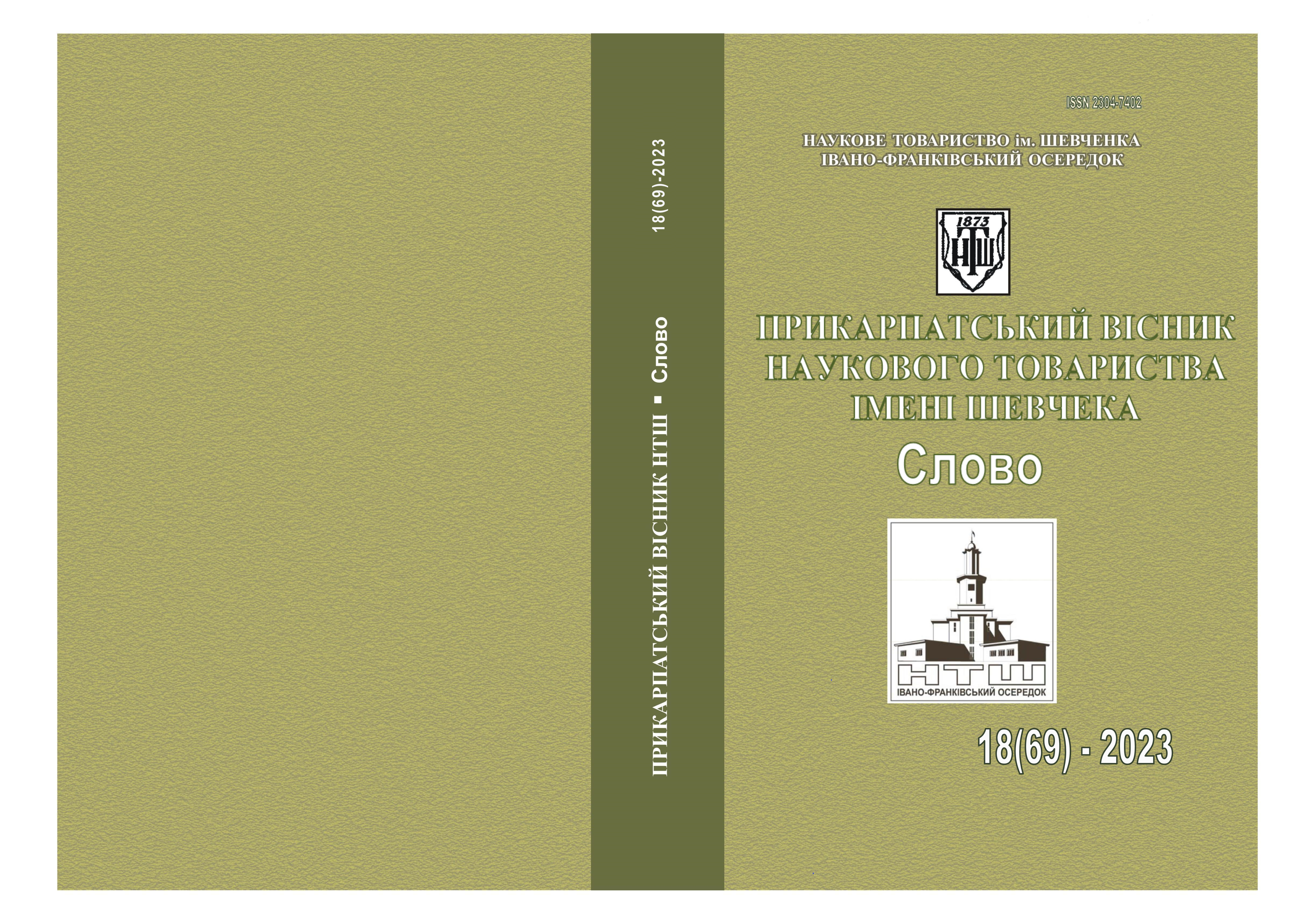P. КULISH AND EUROPEAN LITERATURE: CRITICAL RECEPTION OF THE INTERWAR DECADES
DOI:
https://doi.org/10.31471/2304-7402-2023-18(69)-233-243Keywords:
Kulish studies, Europeism, critical reception, communication, translation, national culture.Abstract
Aim. The article is devoted to the analysis of P. Kulish’s research discourse of the first decades of the twentieth century. Its aim is to comprehend the literary-critical studies of the interwar period, focusing on the peculiarities of Kulish’s interpretation of European artistic experience. Methods. The theoretical and methodological basis of the paper is the receptive-communicative approach, which made it possible to consider the critical reception of P. Kulish's work as a communicative process between the author and addressees, whose individual consciousness was formed in certain socio-political and cultural-historical environments. Results. In the course of the study, it has been proven that the question of P. Kulish’s Europeism was at the centre of intellectual discussions of the day concerning the ways of Ukrainian literature further development. Having become the key point in the choice between the past and the future, traditional and innovative, its own and others, it directly affected the authenticity of the national life of the Ukrainians. In the studies of M. Zerov, M. Mohylianskyi, B. Neiman, V. Petrov, P. Fylypovych, M. Khvylovyi, and others, the foundations were laid for a critical comprehension of Kulish’s heritage, who appealed for thoughtful mastering of foreign-language cultural experience as an important component of national progress. The high professionalism demonstrated in the research laid the groundwork for modern Kulish studies, which exemplify a communicative polylogue open to further scientific search. Originality. The research summarises the factors that writers and critics turn to the figure of P. Kulish; the kinship of the ideological and artistic searches of the figures of the time with the cultural visions of the author of “Black Council” has been traced; and the place and role of the research in the spiritual and cultural progress of the age have been defined. Practical significance. The results of this article can be used in the course of studying P. Kulish's work in general, as well as in the aspect of communicative connections between Ukrainian and foreign literature.
References
Агеєва В. Поетика парадокса: Інтелектуальна проза Віктора Петрова-Домонтовича. Київ: Факт, 2006. 432 c.
Гординський Я. Кулішеві переклади драм Шекспіра // ЗНТШ. - Львів, 1928. - Т. 148. С. 55–164.
Драгоманов М. Листи до Ів. Франка і інших: 1887–1895. Львів: Наклад. Укр.-руської вид. спілки, 1908. 431 с.
Зелік О. Пантелеймон Куліш у критичній рецепції Михайла Могилянського // Філологічні науки. 2009. Вип. 1. С. 72–78.
Зеров М. К. Твори: У 2-х т. Київ: Дніпро, 1990. Т. 1: Поезії. Переклади. 843 с.
Зеров М. К. Твори: У 2-х т. Київ: Дніпро, 1990. Т. 2.: Історико-літературні та літературознавчі праці. 601 с.
Ковалів Ю. Так, «Камо грядеши» // Двадцяті роки: Літературні дискусії, полеміки. Літературно-критичні статті. Упоряд. В. Г. Дончик. Київ: Дніпро, 1991. С.19–68.
Куліш П. Дві мови, книжня і народна // Україна. 1914. Кн. 3. С. 22–34.
Куліш П. О. Твори: У 2-х т. Київ: Дніпро, 1989. Т. 2. 586 с.
Могилянський М. П. О. Куліш у 90-х роках (Листи й документи) // Червоний шлях. 1925. № 8. С. 180–189.
Нахлік Є. Пантелеймон Куліш: особистість, письменник, мислитель: у 2-х т. Київ: Український письменник, 2007. Т. 2: Світогляд і творчість Пантелеймона Куліша. 462с.
Нейман Б. Куліш і Вальтер Скотт // Пантелеймон Куліш. Збірник праць комісії для видавання пам'яток новітнього письменства. Київ, 1927. С. 127–156.
Огієнко І. І. (Митрополит Іларіон). Історія української літературної мови. Київ: Либідь, 1995. 296 с.
Петров В. Вальтер-скоттівська повість з української минувшини // Куліш П. О. Михайло Чарнишенко. Київ: Сяйво, 1928. С. 5–35.
Петров В. Пантелимон Куліш у п’ятдесяті роки. Життя. Ідеологія. Творчість. Київ: Вид-во Всеукраїнської Академії Наук, 1929. 572 с.
Петров Віктор. Розвідки [У 3 т.]. Київ: Темпора, 2013. Т. 2. С. 597–1166.
Рулін П. М. П. Старицький та П. О. Куліш // Життя й революція. 1936. № 12. С. 64–74.
Филипович П. Кулішева варіація сюжету про Навзікаю // Куліш П. Твори. Xарків–Київ, 1930. Т. 1. С. 133–145.
Федорук О. О. Кулішезнавство. Енциклопедія Сучасної України: онлайн-версія / редкол.: І. М. Дзюба та ін.; НАН України, НТШ. Київ: Інститут енциклопедичних досліджень НАН України, 2016. URL: https://esu.com.ua/article-51403
Франко І. Передмова до видання: Гордон Байрон. Чайльд Гарольдова мандрівка. Переклав Панько Куліш // І. Франко. Зібр. творів: У 50 т. Київ: Наукова думка, 1982. Т. 35. С. 405–408 .
Хвильовий М. Думки проти течії // М. Хвильовий. Твори: У 2 т. Київ: Дніпро, 1991. Т. 2. С. 444–514.
Хвильовий М. Камо грядеш. Про демагогічну водичку, або справжня адреса української воронщини, вільна конкуренція, ВУАН і т. д. (Третій лист до літературної молоді). URL: http://ukrlit.org/faily/avtor/khvyliovyi_mykola/khvyliovyi-kamo_hriadeshy.pdf
Хмарин І. Рецензія на переклад поеми Дж. Байрона «Чайльд-Гарольдова мандрівка» у виконанні П. Куліша // Світ. 1906. Ч. 7. С. 110–111.
Червінська О. В. Рецептивна поетика. Історико-методологічні та теоретичні засади: Навч. посібник. Чернівці: Рута, 2001. 56 с.
Щурат В. Фільософічна основа творчости Куліша (В 25-літтє смерти письменника). Львів: Накладом автора, 1922. 132 с.

